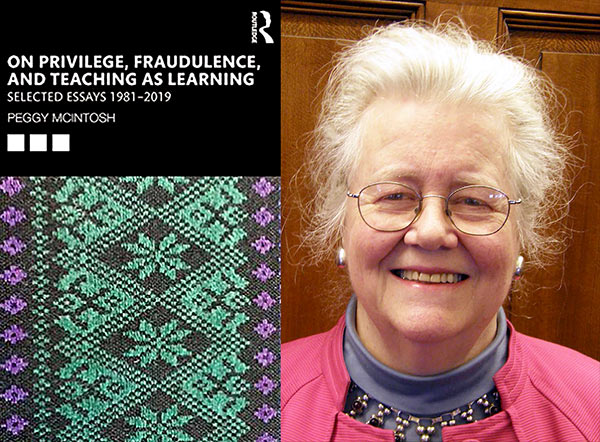Whites have more knowledge. Whites make more knowledge. Knowledge is white. These are the unconscious biases students learn daily in American society — both students of color and white students. And these lessons are reinforced by seeing mostly white faces in front of the classroom, in the courtroom, at the doctor’s office and in popular culture.
Peggy McIntosh, a senior research scientist at the Wellesley Centers for Women, has made counteracting these types of unconscious biases a focus of her work. A leading voice on unearned privilege and anti-racism study, McIntosh was the featured guest for “Exploring Privilege,” an October virtual conversation hosted by NYSUT and the American Federation of Teachers.
Part of the “Many Threads, One Fabric” series on equality and challenging institutional racism, the event explored the concept of unearned privilege and the advantages it conveys.
J. Philippe Abraham, NYSUT secretary-treasurer, whose office handles social justice issues, moderated the event. In his introduction, he quoted a reviewer who called McIntosh “an inspiration for new generations of thinkers, teachers, social justice advocates and anyone dreaming of a more just world.” “I have great respect for her work,” said Abraham. “It’s a privilege to have her with us.”
NYSUT President Andy Pallotta and AFT Executive Vice President Evelyn DeJesus, a longtime United Federation of Teachers leader, also participated.
“Peggy McIntosh has been called an American original and a national treasure,” said Pallotta in welcoming remarks. “We’re delighted she could help us better understand race, bias and other disparities exposed by the pandemic.”
Unearned privilege is hard-wired. So much so that most people don’t realize they have it, explained McIntosh, who spent much of her own life not recognizing her privilege as a white person. “I believed in the myth of meritocracy,” she said. “It was earth shattering to see that a lot of what I had in life I hadn’t earned.”
Privileges like not being harassed while shopping alone; or knowing that if she moved to a new community, her neighbors would be neutral or pleasant to her; or the knowledge that if pulled over by a police officer, or audited by the IRS, it wouldn’t be because of her race.
“Maybe I get grants because the money system is on my side — I never met a foundation employee who wasn’t white,” she said. “I asked myself, ‘What else do I have, that I didn’t earn, because I’m white?’”
The question led to a groundbreaking paper, “White Privilege: Unpacking the Invisible Knapsack,” which explores what McIntosh terms “an invisible package of unearned assets that I can count on cashing in each day, but about which I was ‘meant’ to remain oblivious.”
The assets even benefit poor whites, many of whom enjoy an “exemption from oppression” dark-skinned people don’t, explained McIntosh. The research led her to found the National SEED Project on Inclusive Curriculum — peer-led experiential seminars where group participants share their life experiences and learn from one another. The goal is broadening your worldview to encompass “more than you were taught to include,” she said. “Learning from the rest, especially those you were taught to look down on, is an astonishing experience.”
“I thought I knew about these issues … but you have a way of going deeper and helping us see things in new ways,” DeJesus said to McIntosh. “We’re going to need you even more as we put our country back on the path to racial justice."
NYSUT’s “Many Threads, One Fabric” series will continue with professional development, leadership programs, virtual town halls and training. NYSUT has set up a dedicated email at socialjustice@nysut.org to receive suggestions and feedback.
For links to teaching curriculum and other social justice resources, visit nysut.org/socialjustice.
About Peggy McIntosh

Peggy McIntosh, Ph.D., a leading voice on unearned privilege and anti-racism, is the author of the groundbreaking paper “White Privilege: Unpacking the Invisible Knapsack,” and her recent book, On Privilege, Fraudulence, and Teaching as Learning.
She is a senior research scientist at the Wellesley Centers for Women, and founder of the National SEED Project on Inclusive Curriculum. For 35 years, peer-led experiential SEED (Seeking Educational Equity and Diversity) seminars have helped institutions and individuals to be more gender-fair, multiculturally aware and inclusive of all people. Learn more at nationalseedproject.org.
On Privilege, Fraudulence, And Teaching As Learning: Selected Essays 1981-2019. From one of the world’s leading voices on white privilege and anti-racism work comes this collection of essays complexities of privilege and power. Each of the four parts illustrates Peggy McIntosh’s practice of combining personal and systemic understandings to focus on power in unusual ways. Part I includes McIntosh’s classic and influential essays on privilege, or systems of unearned advantage that correspond to systems of oppression. Part II helps readers to understand that feelings of fraudulence may be imposed by our hierarchical cultures rather than by any actual weaknesses or personal shortcomings. Part III presents McIntosh’s Interactive Phase Theory, highlighting five different world views, or attitudes about power, that affect school curriculum, cultural values, and decisions on taking action. The book concludes with powerful insights from SEED, a peer-led teacher development project that enables individuals and institutions to work collectively toward equity and social justice. This book is the culmination of forty years of McIntosh’s intellectual and organizational work